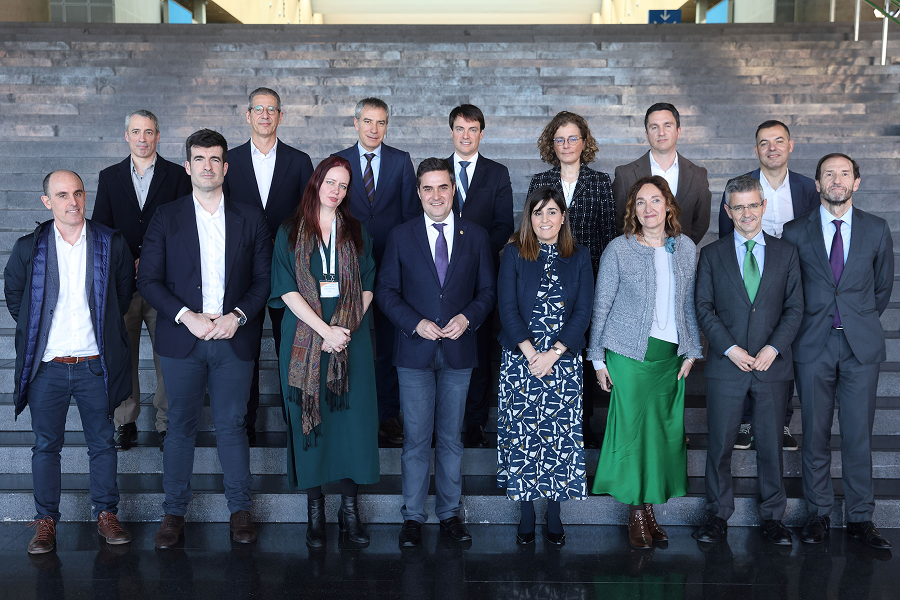The Q-Zero Alliance presented in the Basque Country to discuss decarbonisation’s opportunities for the Basque economy
- This was during the 5th meeting of the Basque Industry Decarbonisation Forum, which focused on the new Clean Industrial Deal, the European Commission's legislative initiative aimed at strengthening industry’s competitiveness and accelerating its transition towards climate neutrality
- In addition to Iberdrola, the industrial clusters of the DCARTECH Alliance participated in the meeting: Aclima, AFV, Energy Cluster, Paper Cluster, Siderex, ACICAE and HEGAN, with the collaboration of the Basque Government through SPRI

The Q-Zero Alliance, promoted by Iberdrola España, was presented today in Bilbao to puscussblicize the opportunities generated by decarbonization for the Basque economy. This took place during the 5th meeting of the Basque Industry Decarbonisation Forum, which focused on the new Clean Industrial Deal, the European Commission's legislative initiative aimed at strengthening industry’s competitiveness and accelerating its transition to climate neutrality. Throughout various presentations and round tables, the implications and opportunities that this new European strategy will offer Basque industry to meet the challenges of decarbonisation were analysed.
The Basque Industry Decarbonisation Forum held its fifth meeting today at the BEC (Bilbao Exhibition Center) since it was opened in 2023. The DCARTECH Alliance’s industrial clusters participated in the event: Aclima, AFV, Energy Cluster, Paper Cluster, Siderex, ACICAE and HEGAN, with the collaboration of the Basque Government, through the Basque Business Development Agency (SPRI), as coordinator of the Net Zero Basque Industrial Super Cluster initiative.
With more than 140 registered participants from 90 organisations, this Forum has established itself as a forum for the demand and supply sides of decarbonisation technological solutions.
As stressed by the Basque Government's Minister for Industry, Energy Transition and Sustainability, Mikel Jauregi, in his closing speech, ‘decarbonisation is a challenge for Basque industry, but also an opportunity. In the last 35 years we have done very important work, with a reduction in industrial emissions of 45% since 1990. We hold ourselves to high standards and we still have work to do. As a country we have a clear goal: to achieve net-zero by 2050. Europe's commitment to the Clean Industry Deal is also the Basque Country's commitment, and the new Industrial Plan we are developing is along these lines. The Basque contribution to this process is to move towards smart decarbonisation with industry and together with industry. The key to this is to do so in an orderly, equal way, favouring competitiveness and clean manufacturing carried out in the EU. We have the technology and innovative capacity to do this’.
5th Decarbonisation Forum
The event was opened by Jose Ignacio Hormaeche, Director General of the Energy Cluster, and Irantzu Allende, Basque Government Deputy Minister for Energy Transition, highlighting the joint work and partnerships between agents for the decarbonisation of Basque industrial activity.
Afterwards, Cristina Oyón, SPRI Group Deputy Director General, explained the status of the Net-Zero Basque Industrial Super Cluster to those present, presenting the latest advances made under the initiative.
Jose Luis Elejalde, Tecnalia's Director of Energy, Climate and Urban Transition, presented the Q-Zero Alliance, promoted by Iberdrola España together with itdUPM and Tecnalia, which aims to accelerate decarbonisation of thermal energy demand in industry and buildings, and already has more than 100 members. Q-Zero was conceived of as a common place for the different entities to discuss the current situation, show achievements, identify bottlenecks, and draw up proposals to accelerate the decarbonisation of heat in the different sectors, maintaining competitiveness and taking advantage of and contributing to realising the opportunities of the energy transition.
Gonzalo Sáenz de Miera, Iberdrola's Director of Climate Change and Alliances, also participated, highlighting the importance of electrification in this strategy marked by the Clean Industrial Deal as a key vector for having competitive and affordable energy in Europe and improving energy autonomy.
Afterwards, Ursula Woodburn, director of Corporate Leaders Groups Europe, presented the keys to the recently published Clean Industrial Deal, highlighting the aspects that particularly affect the industries and strategic lines prioritised in the Net-Zero Basque Industrial Super Cluster.
Marta Sánchez, partner and leader of Ernest&Young's Energy Sector, presented the report An Effective and Efficient Clean Industrial Deal for Europe, which analyses measures to accelerate the decarbonisation of European industry and make it more competitive.
To conclude, a round table moderated by Jose Ignacio Hormaeche (Energy Cluster), Emilio Hidalgo (Sidenor), Patxi Rodríguez (Fagor Ederlan), Asier Ochoa de Eribe (Heidelberg Materials), Iñaki Sánchez (Papresa) and Jose de la Sen (Sener) debated the impact of the Clean Industry Deal on Basque industry.
Net-Zero Basque Industrial Super Cluster
The Net-Zero Basque Industrial Super Cluster aims to accelerate the transition to net emissions in Basque industry, pushing decarbonisation of energy consumption and energy efficiency in industry, while favouring the creation of market opportunities based on technological development and innovation. This initiative is promoted by the Basque Government through the SPRI.
Energy transition opportunity
The Q-Zero Alliance was conceived of as a space open to all actors where all organisations come together, discuss the current situation and their achievements, identify bottlenecks and develop proposals and activities to accelerate the decarbonisation of heat in the different sectors, maintaining competitiveness and leveraging on and contributing to realising the energy transition’s opportunities.
Decarbonisation in industry, especially of thermal demand, is an industrial revolution and a unique opportunity in economic terms and in terms of quality jobs for Spain and in particular for the Basque Country, as it is the way to lead the economy of the future.
The Clean Industrial Deal to be presented by the European Union is the answer to these questions, the aim of which is to increase the European economy’s competitiveness by deepening the decarbonisation of the industrial sector through electrification, the fastest and most efficient way to achieve it.
Heating’s electrification is needed for environmental reasons, but also to increase energy autonomy and reduce fossil fuel imports.
